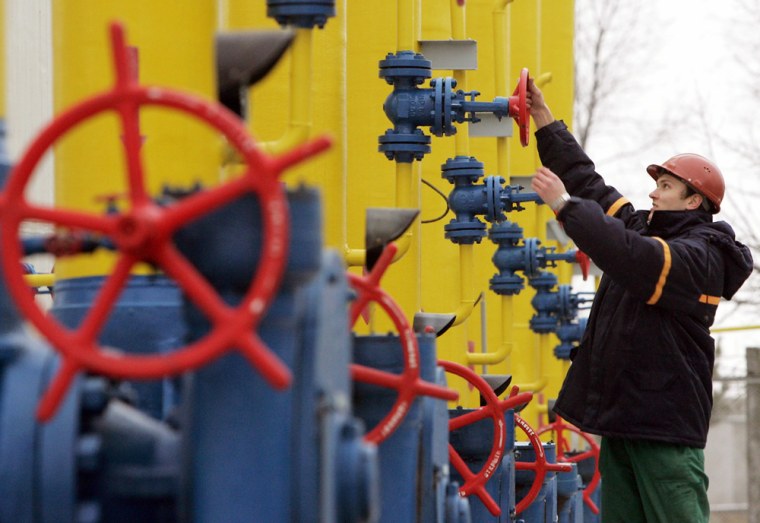Russia and Ukraine reached agreement Wednesday on restoring natural gas supplies to Ukraine, ending — for now, at least — a dispute that ripped an even larger chasm between the two former Soviet republics, rattled European consumers of Russian gas and called into question Moscow’s reputation as a reliable energy provider to the West.
Almost a week after negotiations collapsed amid accusations of blackmail, sabotage and thievery, both Moscow and Kiev claimed victory in the complicated, five-year deal that involves a complex pricing plan, gas from Central Asia and a Russian-Swiss trading business that had been under investigation in Ukraine.
“Two nations won — Russia and Ukraine; Europe won; it is common sense that won,” Ukrainian Prime Minister Yuriy Yekhanurov told reporters in Kiev.
Russian President Vladimir Putin said the deal would reflect positively on the whole range of relations between Moscow and Kiev, saying it would create “stable conditions for deliveries of Russian energy carriers to our Western European partners many years into the future.”
Europe gets about a quarter of its gas from Russia, some 80 percent of that arriving in pipelines that cross Ukraine. While Ukraine buys a third of its gas from Russia, Moscow is also its key supplier.
Mixed reactions
Analysts had mixed reactions to the deal, which has Ukraine buying gas from the RosUkrEnergo trading company for almost twice what it had been paying, but still lower than the fourfold increase Russia originally sought.
The deal is “a very powerful blow which threatens Ukraine with catastrophe,” said Mykhaylo Pohrebinsky, a Kiev-based analyst.
Chris Weafer, chief strategist with Alfa Bank in Moscow, called it a “face-saving compromise” for both countries, but he blamed Russia’s state-controlled gas monopoly, OAO Gazprom, for the impasse.
“What started out as a commercial dispute turned into a political dispute, because it was badly handled,” he said.
The heads of Gazprom and the Ukrainian state-controlled company Naftogaz announced the deal in Moscow on Wednesday, three days after Russia stopped gas deliveries to Ukraine and two days after European customers reported a sharp drop-off in their own gas supplies, which cross Ukraine.
Under the complex deal, Gazprom will sell gas to RosUkrEnergo for the same price it had demanded Ukraine pay beginning Jan. 1 — $230 per 1,000 cubic meters. Ukraine will then buy gas from the company for $95 — nearly twice what it had previously been paying Gazprom.
The deal also makes RosUkrEnergo the sole provider of gas to Ukraine. Little is known about the company, however, except that it is owned by a Gazprom bank and a Swiss subsidiary of Austria’s Raiffeisen Bank. Wolfgang Putschek, a member of the executive board of Raiffeisen Invest, said Centragas was acting as custodian for “a group of international investors in the gas business.”
No one answered the repeated phone calls to RosUkrEnergo’s offices in Zug, Switzerland.
Higher transit fees
The two companies also agreed on a 47 percent increase in the transit fee Gazprom pays to Ukraine to send its gas through the pipelines — to $1.60 per 1,000 cubic meters to travel 100 kilometers. Ukraine will also pay cash for gas deliveries and Russia will pay cash for transit, Gazprom spokesman Sergei Kupriyanov said, ending a barter system that had displeased Russia.
RosUkrEnergo can pay and charge the different prices because it also buys gas from the Central Asian nations of Turkmenistan, Uzbekistan and Kazakhstan that will be added to the mix, Kupriyanov said. According to Ukrainian President Viktor Yushchenko, Turkmen gas sells for about $50 per 1,000 cubic meters.
Overall, the deal appears to be a greater win for Russia. Ukraine will remain subject to market prices and also Turkmenistan’s idiosyncratic president, Saparmurat Niyazov, who has been trying to raise his country’s gas prices. Turkmenistan is Ukraine’s main gas provider, but its gas runs through Russian pipelines.
Trying to curb consumption
Kupriyanov said the agreed price for Russian gas was $230 as of Jan. 1, but it would fluctuate with the market. He did not indicate how often the price would be adjusted.
Among the consequences of the deal will be greater effort in Ukraine to modernize the country’s energy-inefficent industries: “We will do everything possible to sharply reduce gas consumption,” Yekhanurov said.
The gas dispute was the most dramatic clash yet between Kiev and Moscow, whose relations chilled markedly following the 2004 Orange Revolution protests that brought pro-Western opposition leader Yushchenko to power.
Beyond a bilateral dispute, however, were the implications for Europe, which gets about a quarter of its gas from Russia, some 80 percent of that arriving in pipelines that cross Ukraine. As their price dispute reached a climax, Russia stopped selling natural gas to Ukraine on Sunday. By Monday, European customers reported a sharp decline in supplies.
After a wave of criticism from Europe, Russia increased the gas going into Ukrainian pipelines late Monday and supplies returned to normal by Wednesday. Russia had accused Ukraine of siphoning off gas intended for Europe.
Bad way to start top G-8 role
In addition to harming Russia’s reputation as a reliable energy supplier, the spat also gave Moscow a black eye as it assumes the chairmanship of the Group of Eight major industrialized nations — a position Moscow wants to use to boost its international prestige.
RosUkrEnergo last summer was under investigation by Ukraine’s state security agency, which was also probing Naftogaz and groups affiliated with Semyon Mogilevich, a Ukrainian-born Russian citizen and reputed organized crime figure who is wanted by the FBI.
Putschek said “the whole criminal investigation is complete nonsense,” and that all claims of wrongdoing were “politically driven” by former Prime Minister Yulia Tymoshenko, now a key opposition leader, and her ally Oleksandr Turchinov, the former head of the security agency.
